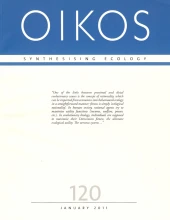This is old but I missed it at the time. An Australian start-up company called Kaggle is offering cash prizes (hundreds to millions of dollars) to get modelers to compete against one another to solve prediction problems. Some recent competitions have been broadly relevant to (and should be open to attack by) quantitatively-minded ecologists, such as developing methods to avoid overfitting models to data, or to automatically recommend R packages. Here’s a write-up in Science.
Interestingly, in at least one case (predicting the progression of HIV infection in individual patients), the winning modelers came up with a better answer than the people who supplied the data!
I’m curious whether one could get this to work if the only incentive was co-authorship on a paper. For instance, I could imagine myself saying, “Here are long-term time series data for a bunch of competing species. I want to develop and parameterize a competition model for this community, and use it to predict the results of an independent study in which I subjected this community to a perturbation. The winning modelers and I will co-author a paper on our findings.” Think anyone would be interested in competing in such a contest?


Wow, Kaggle’s fascinating. Tempted…
As to co-authorship only as a prize, it would really be topic-specific. I imagine the Kaggle contestants are often non-academics in computer science related fields, so the reward of paper authorship wouldn’t be motivating. Your competition audience would be academic modelers interested in either 1) getting out as many papers as possible regardless of topic; or 2) academic modelers specifically interested in your question. And for #2, isn’t that mostly how things work already anyway? “Hey, I’ve got an idea and some data and some money for a post-doc. Who wants to compete (apply) to work with me?”
By: Margaret on December 8, 2011
at 3:11 pm
I basically agree regarding co-authorship as a prize. I did have the thought that your category #1 might include grad student modelers looking for a side project, and that your category #2 might include people who I don’t know personally, or perhaps even know of. So in both cases the contest aspect might (emphasis on *might*) generate a collaboration that wouldn’t have otherwise happened if I limited myself to looking for collaborators in the usual ways.
By: oikosjeremy on December 8, 2011
at 3:35 pm